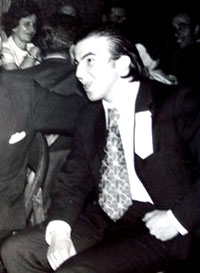|

Jorge
Patricio Dillon (1953-ca.1977)
(photographer
unknown, 1971) |
Dillon,
Jorge Patricio (Patricio)
(1953-c.1977), student
activist and social worker, was born on 13 October 1953 in
General Roca, Río Negro Province, Argentina, the only child of
Juan Antonio Guillermo Dillon (1926-1957) and his wife, Sara
Gigena (b.1930). The Dillon family descended from David Dillon
(1816-1866) of Limerick, who emigrated to Argentina to work in
the British railways and settled in Monte, Buenos Aires
Province. David Dillon’s youngest son, Bernardo José Dillon
(1859-1931), born in Monte, studied at the school of medicine in
London and practiced in Ireland. He returned to Argentina and
worked at the British Hospital of Buenos Aires and the Southern
Railway Company. His son, Juan Carlos Dillon - Patricio’s
grandfather - was one of the first colonists in Chinchinales,
near General Roca in the Patagonian province of Río Negro,
1,120 kilometres from Buenos Aires.
Patricio
Dillon was sent to study at San Miguel primary school in General
Roca, and then to Don Bosco secondary school, both founded and
managed by the Roman Catholic Society of St. Francis de Sales
(Salesian Fathers). At twelve he was already engaged in
political activities, and supported the return of Juan D. Perón
from exile in Spain. His engagement would be intensified during
the rebellion of the people of General Roca in June 1972 against
the de facto military governor Roberto Requeijo (a revolt
known as 'El Rocazo').
After
completing secondary school, Dillon went to Buenos Aires in 1972
to study literature at the University of Buenos Aires. He also
worked at the Azcuénaga branch of the Provincial Bank of Buenos
Aires. Patricio Dillon joined the Peronist Youth movement and
was appointed trade union delegate at his branch of the bank.
Additionally, he worked for a programme on Radio Mitre of Buenos
Aires, a continuation of his recreational radio show at his
school in Río Negro (which he introduced as 'Radio
Cachivache'). In 1973 Dillon was one of the thousands of people
who went to Ezeiza Airport in the city of Buenos Aires to
welcome Perón when he arrived in Argentina. He lived in a house
at 1400 Cangallo Street, and was a member of a Montoneros
support group.
Dillon
was a natural leader, and had an acute understanding of, and
sensitivity for, the problems of contemporary Argentine society.
He was a self-made idealist and a courageous radical who chose
to stay in the country amidst increasing threats to student
activists and militant members of political movements.
On
20 January 1977, Patricio Dillon was kidnapped, together with
other students, and interned in the secret detention camp 'Club
Atlético' at Paseo Colón and Juan de Garay Streets of Buenos
Aires. His detention may have been the responsibility of Major
Arias Duval, muy buen tipo
a pesar de ser militar ('a very good chap in spite of being
a soldier', Dillon to Dillon, 13 April 1974, p. 2), for whom
Patricio worked as secretary during his military service in Junín
de los Andes. Patricio became one of the 20-25,000 so-called desaparecidos
(‘disappeared’) - political prisoners illegally abducted,
tortured and killed by the armed forces in Argentina from 1974
to 1983.
Edmundo
Murray
Acknowledgements
I
am grateful to Dr. Enrique Raimondo for information about the
Dillon family of Río Negro, and the photographs and documents
of Jorge Patricio Dillon.
References
-
Yappert, Susana. 'Raimondo-Dillon: una peculiar mezcla de
italianos e irlandeses' in Río Negro (20 January 2007),
website
(http://www.rionegro.com.ar/diario/rural/2007/01/20/5046.php),
cited 4 September 2007.
-
Jorge Patricio Dillon to Juan Dillon (Junín de los Andes), 13
April 1974, manuscript letter to his grandfather; family
collection.
|

